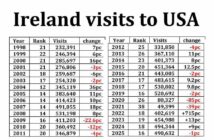
Restaurants Association CEO Adrian Cummins says that grassroots advocacy and pressure from businesses has led to a rethink of the 9pc Vat issue.
Speaking at the annual conference of the Irish Self Catering Federation Mr Cummins noted that four political parties now support a VAT reduction to 9pc or 11pc, likely due to
The rally outside the Dáil, the first in the history of the restaurants Association of Ireland (RAI) highlighted the need for government action, although he retains a healthy skepticism about political promises not translating into real actions once parties are in power.
He said that, while there’s been some progress in discussions about support for businesses, many are struggling due to factors like accrued warehouse tax and increased input costs, particularly in the food sector.
Overall costs remain a major concern for businesses, exacerbated by rising minimum wage rates and inflation, leading to a loss of margins and an increase in business closures across the industry.
Well, it’s a big turnaround. For months we have been listening to politicians saying: I couldn’t find the money, and many political parties said they didn’t want to take action. But in the space of a couple of weeks, we’ve turned around to have, I think, four political parties now saying they would support 9pc or 11pc VAT. I think this is thanks to the advocacy of the members on the ground with those businesses.
When we did the rally outside the Dáil, which we had never done before, we received feedback from backbenchers saying they were feeling the pressure. There is something to be achieved here, but we have to wait for the program for government. Some political parties promise things and don’t deliver once they get into government.
To be fair, we are in a better place now than we were 10 or 12 months ago; at least the conversation is back on the table.
When those businesses are closing down, they often say they can’t make a margin or have accrued a substantial amount of warehouse tax that they cannot pay back. The issue of warehouse tax is significant, and the increased VAT from September didn’t help either. Additionally, the cost of inputs has risen substantially; food inputs have increased across the entire economy.
I think when you look back at the season, some parts of the country had a very decent summer, while the vast majority experienced a flat summer in terms of tourist numbers. We would question the CSO data and wonder what’s effective. I think it needs to be examined in more detail.
From a business perspective, costs are a huge issue, not just for ourselves but across the entire economy. A lot of this is influenced by government policy regarding wage inflation. The minimum wage might increase by 7pc to 10pc, and while it’s not just the rate of pay, that percentage increase has a knock-on effect across our industry. We’re trying to manage how to keep pricing competitive while making margins, which have disappeared this year, leading to a substantial number of businesses closing down.
I believe we haven’t seen the worst of it yet. If we didn’t have American business, the country would face considerable challenges in terms of tourism. America has a significant market, and there are many businesses benefiting from the American tourist spend. Dublin is becoming a hub for many airports across the U.S., facilitating travel into Europe.
In our industry, I think we need to have a full and frank conversation about where we’re headed as a sector. Currently, we have two sectors—hospitality and tourism—that don’t interlink well. Prior to 2020, we had one minister responsible for both tourism and hospitality. We need that integration again, with a competent minister who understands our industry.
The old adage 30pc for food, 30pc for overall costs, and 30pc for labour, with a 10pc margin, definitely needs to be reexamined. What are the new percentages in the modern world? The new percentages indicate that you’re probably looking at margins of around 4pc to 5pc. The vast majority of businesses are now treading water.
You’ll likely see more contraction in labour in our industry, as businesses need to bring that wage percentage down. In our industry, the wage percentage of turnover should be around 30pc to 33pc, but it’s currently gone well over 40pc. If you’re trying to operate on a margin of around 10pc, those margins will disappear.
For every two or three businesses closing in our sector, probably only one is opening up. We know this from the data, but those businesses that are opening tend to be leaner, having stripped out a lot of labour costs. They may also operate at a higher market level with niche offerings, catering to customers with more disposable income.
However, there is still a lot of demand. If you walk into a restaurant on a Friday or Saturday night, it’s packed.
As for my message to the incoming Minister for Tourism, Transport, Media, Arts, and so on—whoever ends up in that department—I hope they’ll take tourism seriously. It feels like tourism and hospitality are often treated as an afterthought rather than being recognized as Ireland’s biggest indigenous industry. I want the incoming ministers to understand the importance of taking tourism seriously.




